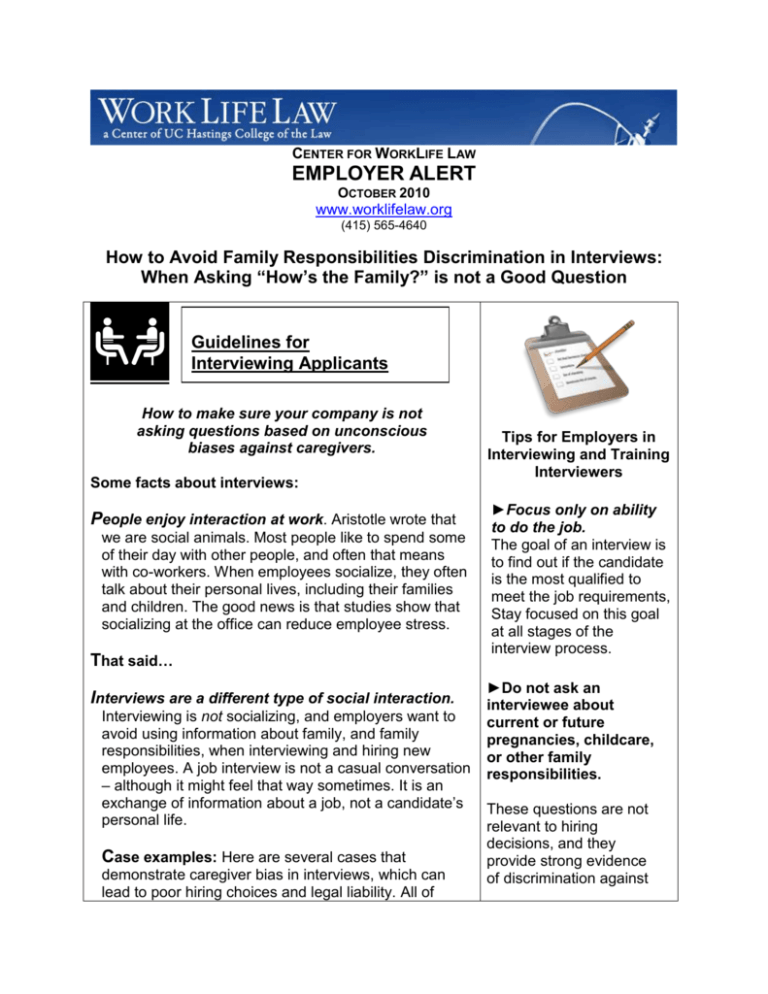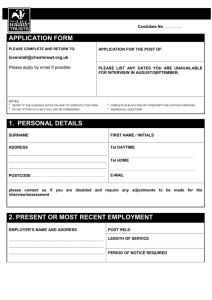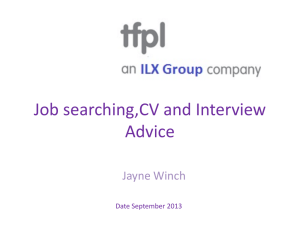When Asking
advertisement

CENTER FOR WORKLIFE LAW EMPLOYER ALERT OCTOBER 2010 www.worklifelaw.org (415) 565-4640 How to Avoid Family Responsibilities Discrimination in Interviews: When Asking “How’s the Family?” is not a Good Question Guidelines for Interviewing Applicants How to make sure your company is not asking questions based on unconscious biases against caregivers. Some facts about interviews: People enjoy interaction at work. Aristotle wrote that we are social animals. Most people like to spend some of their day with other people, and often that means with co-workers. When employees socialize, they often talk about their personal lives, including their families and children. The good news is that studies show that socializing at the office can reduce employee stress. That said… Interviews are a different type of social interaction. Interviewing is not socializing, and employers want to avoid using information about family, and family responsibilities, when interviewing and hiring new employees. A job interview is not a casual conversation – although it might feel that way sometimes. It is an exchange of information about a job, not a candidate’s personal life. Case examples: Here are several cases that demonstrate caregiver bias in interviews, which can lead to poor hiring choices and legal liability. All of Tips for Employers in Interviewing and Training Interviewers ►Focus only on ability to do the job. The goal of an interview is to find out if the candidate is the most qualified to meet the job requirements, Stay focused on this goal at all stages of the interview process. ►Do not ask an interviewee about current or future pregnancies, childcare, or other family responsibilities. These questions are not relevant to hiring decisions, and they provide strong evidence of discrimination against these fact patterns led to damage awards for the employee: A clothing clerk who had revealed to her interviewer that she was pregnant was told by a manager after the interview to "come back after she had the baby." EEOC v. Wal-Mart Stores, Inc. An applicant was asked during her job interview whether she planned to have children. She protested that the question was discriminatory, but at least one hiring committee member insisted that she answer the question because he did not want to hire “some woman” who would just get pregnant and quit. Barbano v. Madison County. During a law clerk’s interview for an associate position, she mentioned she had a small child and that she planned to have more children. The interviewer told the company that the clerk’s priorities were “elsewhere” and that he would not have even hired her as a clerk if he had known she was pregnant. Wynn & Wynn v. MA Commission against Discrimination. We are often asked if it is illegal to ask questions about family responsibilities in an interview. The answer is, like all good legal answers, “it depends.” If the employer is in Connecticut, the District of Columbia, or one of the counties or cities that has expressly prohibited family responsibilities discrimination by statute, then the answer is that it is most likely illegal. If the employer is not in one of those jurisdictions, the answer is that it is illegal if the questions are asked (and the answers presumably relied upon) only of female candidates. In such a situation, the questions would likely constitute sex discrimination. Regardless of whether such questions are illegal, they certainly are too risky to be a good business practice. caregivers in an ensuing lawsuit against the company. ►When an interviewee volunteers information about his or her family or family plans, don’t follow up, write it down, consider it or share it with other staff making hiring decisions. Since employers must not make hiring decisions based on an individual’s family responsibilities, any information that the employee volunteers about their family does not need to be communicated to other decision-makers. Don’t ask follow up questions on it, and omit it from interview notes and discussions of job candidates. ►Ask all the interviewees caregiverneutral questions. If a job requires long hours or travel, ask whether the applicant can work long hours or travel. Period. There is no need to ask how they can do this-- even if they volunteer that they have quadruplets at home. It is very important to ask all the applicants the More Resources for Employers: Visit the Employer Section of our WorkLife Law website to view suggestions for employer best practices for avoiding discrimination lawsuits, model FRD policies, available trainings and more: http://www.worklifelaw.org/ForEmployers.html. You received this e-mail because you recently attended a program sponsored by WLL or you sent WLL an e-mail asking us to add you to our distribution list for employer e-mail alerts. If you wish to be removed from our distribution list, please send an email to employeralerts@worklifelaw.org. If you have found this alert to be useful, please feel free to pass it on to colleagues. New readers can subscribe to WLL's Employer Alert by sending an email to employeralerts@worklifelaw.org. This Employer Alert is provided for general information purposes only. Any information contained in this alert should not be construed as legal advice and is not intended to be a substitute for legal counsel. same questions, regardless of gender. ►Raise awareness through training. Train your HR staff, recruiters and anyone else who interviews candidates in proper, lawful interview protocols. If you need help with this training, WorkLife Law has developed fee-based training programs to assist employers. For more information, please call Linda Marks, Director of Training and Consulting, at (415) 565-4640.







